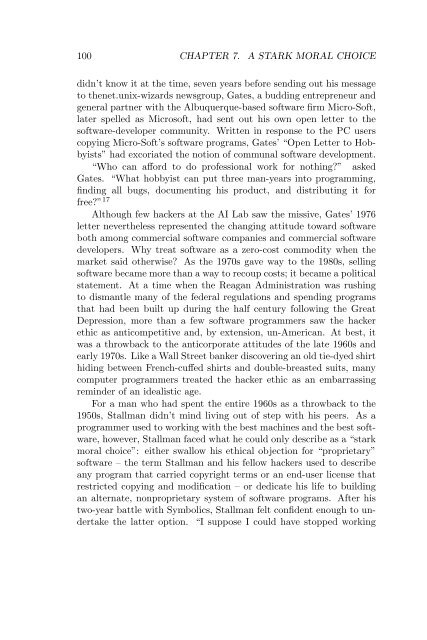You also want an ePaper? Increase the reach of your titles
YUMPU automatically turns print PDFs into web optimized ePapers that Google loves.
100 CHAPTER 7. A STARK MORAL CHOICE<br />
didn’t know it at the time, seven years before sending out his message<br />
to thenet.unix-wizards newsgroup, Gates, a budding entrepreneur and<br />
general partner with the Albuquerque-based software firm Micro-Soft,<br />
later spelled as Microsoft, had sent out his own open letter to the<br />
software-developer community. Written in response to the PC users<br />
copying Micro-Soft’s software programs, Gates’ “Open Letter to Hobbyists”<br />
had excoriated the notion of communal software development.<br />
“Who can afford to do professional work for nothing?” asked<br />
Gates. “What hobbyist can put three man-years into programming,<br />
finding all bugs, documenting his product, and distributing it for<br />
free?” 17<br />
Although few hackers at the AI Lab saw the missive, Gates’ 1976<br />
letter nevertheless represented the changing attitude toward software<br />
both among commercial software companies and commercial software<br />
developers. Why treat software as a zero-cost commodity when the<br />
market said otherwise? As the 1970s gave way to the 1980s, selling<br />
software became more than a way to recoup costs; it became a political<br />
statement. At a time when the Reagan Administration was rushing<br />
to dismantle many of the federal regulations and spending programs<br />
that had been built up during the half century following the Great<br />
Depression, more than a few software programmers saw the hacker<br />
ethic as anticompetitive and, by extension, un-American. At best, it<br />
was a throwback to the anticorporate attitudes of the late 1960s and<br />
early 1970s. Like a Wall Street banker discovering an old tie-dyed shirt<br />
hiding between French-cuffed shirts and double-breasted suits, many<br />
computer programmers treated the hacker ethic as an embarrassing<br />
reminder of an idealistic age.<br />
For a man who had spent the entire 1960s as a throwback to the<br />
1950s, Stallman didn’t mind living out of step with his peers. As a<br />
programmer used to working with the best machines and the best software,<br />
however, Stallman faced what he could only describe as a “stark<br />
moral choice”: either swallow his ethical objection for “proprietary”<br />
software – the term Stallman and his fellow hackers used to describe<br />
any program that carried copyright terms or an end-user license that<br />
restricted copying and modification – or dedicate his life to building<br />
an alternate, nonproprietary system of software programs. After his<br />
two-year battle with Symbolics, Stallman felt confident enough to undertake<br />
the latter option. “I suppose I could have stopped working


